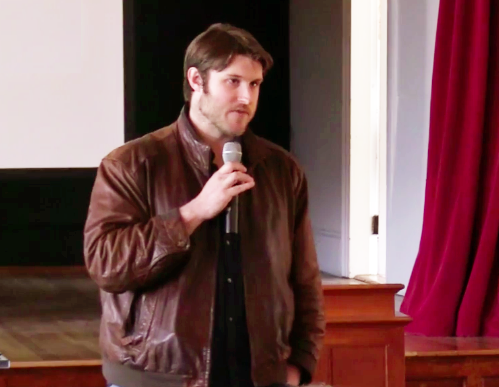By Barbara Slayter and Peter Pease
Co-chairs, Lincoln Democratic Town Committee
Dozens of Lincoln residents turned out to learn how to become effective advocates around the issues of environmental justice and climate change at a session led by Andrew Gordon, legislative coordinator from 350 Mass, a grassroots environmental organization.
Gordon, who spoke on April 6 at the invitation of Lincoln’s Democratic Town Committee, began by outlining his organization’s agenda:
- Environmental justice — acknowledging that race and class usually correlate closely with pollution, unequal protection, and vulnerability, and that the communities most negatively affected by climate change and fossil fuel pollution must be central to implementing new policies and must not be harmed by them.
- Renewable energy — aiming for 100% by 2045 including heating and transportation, with 100% renewable in electricity by 2035
- Equitable and green investment in our communities to become net zero in greenhouse gas emissions, directing revenue and resources to disadvantaged communities that are less able to take effective action without help from the Commonwealth.
Gordon also introduced some new names, policies, and concepts, including:
- Marshall Ganz, a prominent Harvard professor who writes and lecturers on leadership, organizing communities and mobilizing for change.
- The Transportation and Climate Initiative, whereby 13 states are developing a regional low-carbon transportation policy to set up a carbon pricing mechanism to reduce transport emissions.
- Carbon pricing — levying an added charge on carbon-emitting fuels, with variations including a revenue-neutral proposal long advocated by Sen. Michael Barrett, or a Massachusetts House version by Rep. Jennifer Benson in which fees charged would be returned to poorer communities for green infrastructure.
- Mass Power Forward, a coalition of various environmental and other civil society groups working to provide Massachusetts and the broader region with clean, affordable reliable energy and a thriving economy.
Attendees had detailed questions and comments about costs, trade-offs, timelines, and the magnitude of the challenges ahead as Massachusetts and the nation try to address the problems of climate change. Buzz Constable went to the heart of the issue, asking, “Can we really solve social problems and climate change at the same time?” Is there an inherent conflict between “going slow together to get it right” and the urgent timeframe for diminishing carbon emissions?
Larry Buell asked about approaches for galvanizing disadvantaged communities and ways to provide incentives for poorer communities to participate in climate change policies. Joan Kimball raised a concern about the high levels of compartmentalization of professionals such as those working in the health and environmental fields.
Gordon made a compelling argument for the need to “push and expand the narrative of what is possible” if we wish to transform our economy and address the escalating problems of climate change. He reminded us of the years required to enact comprehensive, effective policies. The text cannot be filed and then voted into law in the same year. Everyone needs to be able to take ownership and help refine the policies, he said.
Some suggestions for effective advocacy, particularly with regard to the Massachusetts legislature, emerged from event for activists of all stripes:
- Build coalitions with like-minded groups and organizations.
- Let your voice be heard and be vigilant in expressing your views.
- Be inclusive, bring in the stakeholders, and bring key people to the table.
- Figure out your next “ask,” and then ask it with persistence.
- Activate your networks outside Lincoln.
- Make sure your representatives know you want them to direct resources to other, disadvantaged communities.
- Be proactive in your expenditure of political capital.
- Build and sustain the connections between electoral activities and issues-oriented organizations in order to change policy outcomes.
Click here to watch a recording of the event, including charts (the sound is missing only for the first minute or so).

Thanks very much, Barbara and Peter, for organizing this event and for sharing this excellent summary.